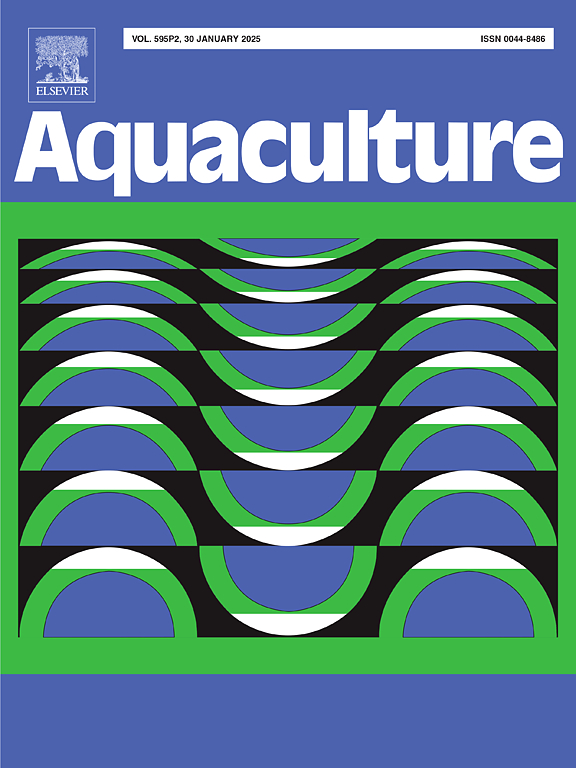调节虾的肠道微生物-免疫轴:使用益生菌增强抗病能力
IF 3.9
1区 农林科学
Q1 FISHERIES
引用次数: 0
摘要
对虾养殖在世界范围内是一个快速发展的产业。然而,集约化耕作方式造成的疾病暴发往往限制了生产。益生菌可能通过调节肠道微生物群-免疫轴,为促进虾的生长、免疫和抗病性提供了一种天然的、经济有效的手段。本文综述了对虾肠道微生物群与免疫系统的已知相互作用,重点介绍了益生菌如何用于对虾养殖。我们首先讨论了虾肠道微生物群的组成,以及外部应激源或病原体如何调节微生物群并促进疾病进展。然后,我们探讨了益生菌在虾肠道微生物群维持中的潜在作用,以及这些药物如何提高免疫反应和抗病能力。促进益生菌效应的关键机制包括短链脂肪酸(SCFAs)的产生、肠膜完整性的维持、免疫相关基因的调节以及通过c型凝集素(如Ctl24和Ctl33)调节肠道稳态。此外,益生菌可以通过血清学、粘膜和病原体相关分子模式(PAMP)介导的过程启动对虾的免疫系统。整合微生物组学、代谢组学和转录组学数据的研究可以全面揭示这些效应。最后,本文综述了未来的研究方向,如使用基于人工智能的系统来改进疾病的早期检测,工程益生菌的应用,以及根据农业条件量身定制的微生物组干预。此外,进一步了解益生菌对生态系统的长期影响和对人类消费的影响对于充分发挥益生菌在可持续对虾养殖中的潜力至关重要。本文章由计算机程序翻译,如有差异,请以英文原文为准。
Modulating the gut microbiome-immune axis in shrimp: Use of probiotics to enhance disease resistance
Shrimp aquaculture is a rapidly growing industry worldwide. However, disease outbreaks due to intensive farming practices often limit production. Probiotics may offer a natural, cost-effective means of enhancing shrimp growth, immunity and disease resistance, acting via modulation of the gut microbiome-immune axis. This review describes the known interactions of the shrimp gut microbiome with the immune system, focusing on how probiotics can be used to benefit shrimp aquaculture. We first discuss the composition of the shrimp gut microbiome and how external stressors or pathogens can modulate the microbiota and contribute to disease progression. Then, we explore the potential roles of probiotics in shrimp gut microbiome maintenance and how these agents may improve immune responses and disease resistance. Key mechanisms contributing to probiotic effects include the production of short-chain fatty acids (SCFAs), maintenance of gut membrane integrity, modulation of immune-related genes, and regulation of intestinal homeostasis via C-type lectins (e.g., Ctl24 and Ctl33). Furthermore, probiotics can prime the shrimp immune system through serological, mucosal and pathogen-associated molecular pattern (PAMP)-mediated processes. Studies integrating microbiome, metabolomic and transcriptomic data can comprehensively reveal these effects. Finally, this review highlights future research directions, such as the use of artificial intelligence-based systems for improved early detection of disease, the application of engineered probiotics, and tailored microbiome interventions based on farming conditions. Moreover, further understanding of the long-term ecosystem impacts and effects on humans upon consumption will be crucial for realizing the full potential of probiotics in sustainable shrimp aquaculture.
求助全文
通过发布文献求助,成功后即可免费获取论文全文。
去求助
来源期刊

Aquaculture
农林科学-海洋与淡水生物学
CiteScore
8.60
自引率
17.80%
发文量
1246
审稿时长
56 days
期刊介绍:
Aquaculture is an international journal for the exploration, improvement and management of all freshwater and marine food resources. It publishes novel and innovative research of world-wide interest on farming of aquatic organisms, which includes finfish, mollusks, crustaceans and aquatic plants for human consumption. Research on ornamentals is not a focus of the Journal. Aquaculture only publishes papers with a clear relevance to improving aquaculture practices or a potential application.
 求助内容:
求助内容: 应助结果提醒方式:
应助结果提醒方式:


